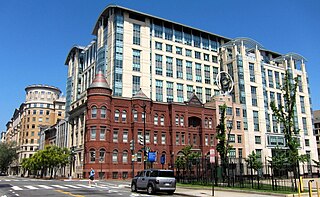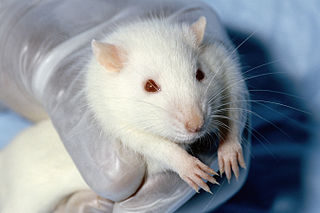
The National Academies of Sciences, Engineering, and Medicine (NASEM), also known as the National Academies, is a congressionally chartered organization that serves as the collective scientific national academy of the United States. The name is used interchangeably in two senses: (1) as an umbrella term or parent organization for its three sub-divisions that operate as quasi-independent honorific learned society member organizations known as the National Academy of Sciences (NAS), the National Academy of Engineering (NAE), and the National Academy of Medicine (NAM); and (2) as the brand for studies and reports issued by the unified operating arm of the three academies originally known as the National Research Council (NRC). The National Academies also serve as public policy advisors, research institutes, think tanks, and public administration consultants on issues of public importance or on request by the government.

Animal welfare is the well-being of non-human animals. Formal standards of animal welfare vary between contexts, but are debated mostly by animal welfare groups, legislators, and academics. Animal welfare science uses measures such as longevity, disease, immunosuppression, behavior, physiology, and reproduction, although there is debate about which of these best indicate animal welfare.

Huntingdon Life Sciences (HLS) was a contract research organisation (CRO) founded in 1951 in Cambridgeshire, England. It had two laboratories in the United Kingdom and one in the United States. With over 1,600 staff, it was until 2015 the largest non-clinical CRO in Europe. In September 2015, Huntingdon Life Sciences, Harlan Laboratories, GFA, NDA Analytics and LSR associates merged into Envigo, which later sold off the CRO part.

The Association of Zoos and Aquariums (AZA), originally the American Association of Zoological Parks and Aquariums, is an American 501(c)(3) nonprofit organization founded in 1924 and dedicated to the advancement of zoos and public aquariums in the areas of conservation, education, science, and recreation. AZA is headquartered in Silver Spring, Maryland, and accredits zoos. There were 238 accredited facilities as of 2019, primarily in the US, and also a handful in eleven other countries.

Roswell Park Comprehensive Cancer Center is a cancer research and treatment center located in Buffalo, New York. Founded by surgeon Roswell Park in 1898, the center was the first in the United States to specifically focus on cancer research. The center is usually called Roswell Park in short. The center, which conducts clinical research on cancer as well as the development new drugs, provides advanced treatment for all forms of adult and pediatric cancer, and serves as a member of the National Comprehensive Cancer Network. Roswell Park Comprehensive Cancer Center is as of 2019, the only upstate New York facility to hold the National Cancer Institute designation of "comprehensive cancer center".

The Animal Welfare Act was signed into law by President Lyndon B. Johnson on August 24, 1966. It is the main federal law in the United States that regulates the treatment of animals in research and exhibition. Other laws, policies, and guidelines may include additional species coverage or specifications for animal care and use, but all refer to the Animal Welfare Act as the minimally acceptable standard for animal treatment and care. The USDA and APHIS oversee the AWA and the House and Senate Agriculture Committees have primary legislative jurisdiction over the Act. Animals covered under this Act include any live or dead cat, dog, hamster, rabbit, nonhuman primate, guinea pig, and any other warm-blooded animal determined by the Secretary of Agriculture for research, pet use or exhibition. Excluded from the Act are birds, rats of the genus Rattus, mice of the genus Mus, farm animals, and all cold-blooded animals.
The Joint Commission is a United States-based nonprofit tax-exempt 501(c) organization that accredits more than 22,000 US health care organizations and programs. The international branch accredits medical services from around the world.

Mote Marine Laboratory is an independent, nonprofit, marine research organization based on City Island in Sarasota, Florida, with additional campuses in eastern Sarasota County, Boca Grande, Florida, and the Florida Keys. Founded in 1955 by Eugenie Clark in Placida, Florida, it was known as the Cape Haze Marine Laboratory until 1967. The laboratory aims to advance marine science and education, supporting conservation and sustainable use of marine resources. A public aquarium and associated education program interpret its research for the public.
The U.S. Navy Marine Mammal Program (NMMP) is a program administered by the U.S. Navy which studies the military use of marine mammals - principally bottlenose dolphins and California sea lions - and trains animals to perform tasks such as ship and harbor protection, mine detection and clearance, and equipment recovery. The program is based in San Diego, California, where animals are housed and trained on an ongoing basis. NMMP animal teams have been deployed for use in combat zones, such as during the Vietnam War and the Iraq War.

Institutional Animal Care and Use Committees (IACUCs) are centrally important in applying laws about animal research in the United States. Similar systems operate in other countries, but generally under different titles; for example, in Canada a typical title would be the University Animal Care Committee (UACC), while in the United Kingdom it would be the Animal Welfare and Ethical Review Body (AWERB).
ISO/IEC 17025General requirements for the competence of testing and calibration laboratories is the main standard used by testing and calibration laboratories. In most countries, ISO/IEC 17025 is the standard for which most labs must hold accreditation in order to be deemed technically competent. In many cases, suppliers and regulatory authorities will not accept test or calibration results from a lab that is not accredited. Originally known as ISO/IEC Guide 25, ISO/IEC 17025 was initially issued by ISO/IEC in 1999. There are many commonalities with the ISO 9000 standard, but ISO/IEC 17025 is more specific in requirements for competence and applies directly to those organizations that produce testing and calibration results and is based on more technical principles. Laboratories use ISO/IEC 17025 to implement a quality system aimed at improving their ability to consistently produce valid results. Material in the standard also forms the basis for accreditation from an accreditation body.
The Standards Council of Canada (SCC) (French: Conseil canadien des normes (CCN)) is a Canadian crown corporation with the mandate to promote voluntary standardization in Canada. The SCC is responsible for:

Animal testing regulations are guidelines that permit and control the use of non-human animals for scientific experimentation. They vary greatly around the world, but most governments aim to control the number of times individual animals may be used; the overall numbers used; and the degree of pain that may be inflicted without anesthetic.
Harry Rozmiarek was a noted veterinarian, academic, and laboratory animal care specialist.

The National Association for Biomedical Research (NABR) is an American nonprofit organization, 501(c)(6), located in Washington, DC. NABR was formed in 1985 when the Association of Biomedical Research merged with the National Society for Medical Research The NABR advocates for the continued use of animals in biomedical research albeit in as humane a manner as possible.
Rise for Animals is a national, registered 501(c)(3) nonprofit animal rights organization which aims to end nonhuman animal experimentation. It has been described as "one of the oldest and wealthiest anti-vivisection organizations in the United States".
A Designated Member Review (DMR) or Designated Subcommittee Review (DSR), also known as Designated Review, is a review of a protocol where a committee designates one or more members of the committee to review a decisionmaking process or a protocol or procedure, a review which would ordinarily require the full committee's review. Typically this pertains to IACUCs.
The Armed Forces Research Institute of Medical Sciences (AFRIMS) is a United States Army project that started as a collaboration with the Government of Thailand to fight a cholera outbreak in Bangkok in 1958 and 1959. It subsequently expanded to conduct military medical research, primarily involving infectious diseases, across much of Southeast Asia and the Indian Subcontinent.

Envigo (en-VEE-go) is a privately held contract research organization and laboratory animal sourcer that provides live animals and related products and services to pharmaceutical and biotechnology industries, government, academia and other life science organizations engaged in animal testing. The company breeds and sells research animals – which are referred to in the industry as "research models"– including rodents, rabbits, beagles and non-human primates. Envigo is headquartered in Indianapolis, Indiana and employs more than 1,200 people at 30+ locations across North America, Europe and the Middle East.









